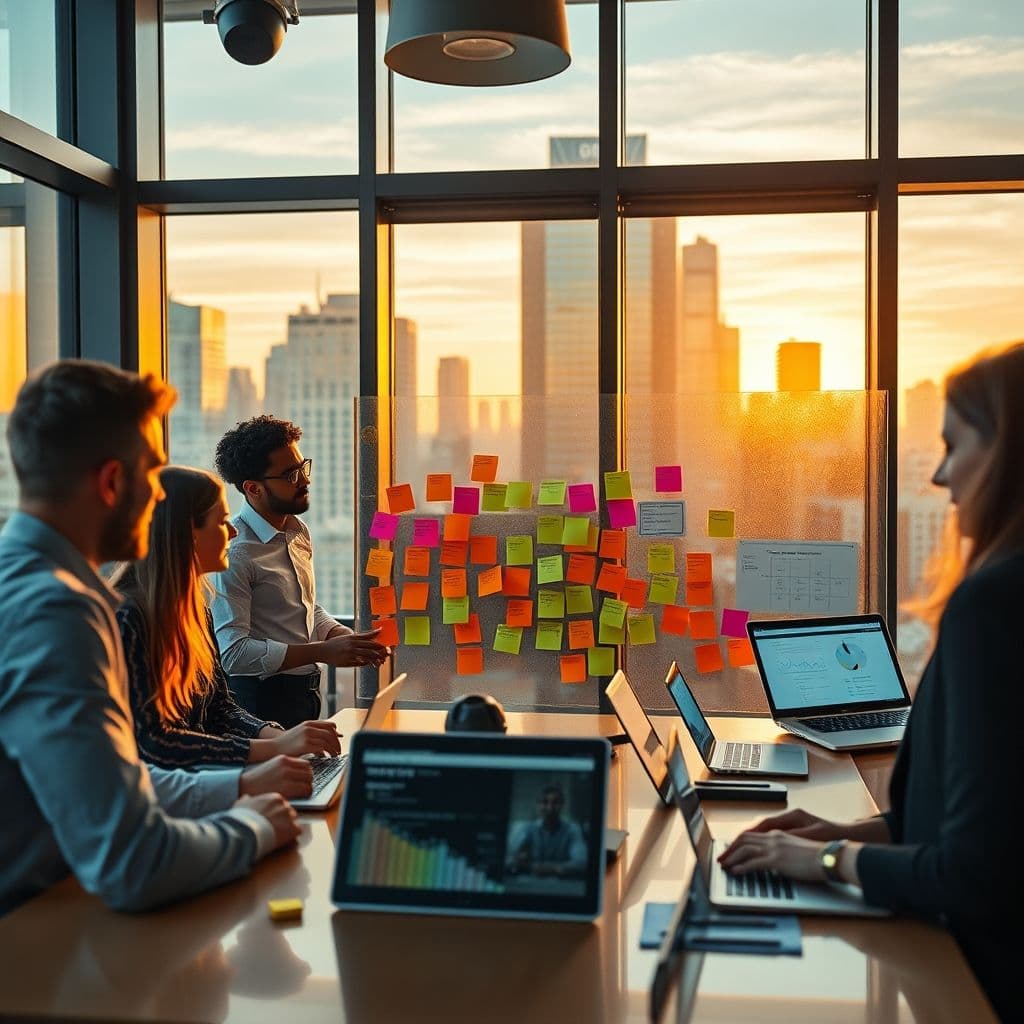Facilitation Mastery: Your Complete Guide to Leading Productive Meetings and Workshops

Picture this: You walk into a meeting room filled with diverse personalities, conflicting opinions, and tight deadlines. Within hours, you've transformed chaos into clarity, guided heated debates into productive discussions, and helped the team reach decisions they're all excited about. This isn't magic—it's facilitation mastery. Whether you're leading team meetings, running workshops, or moderating complex discussions, the ability to facilitate effectively is a superpower in today's collaborative workplace. Great facilitators don't just manage conversations; they unlock collective intelligence, foster innovation, and create environments where every voice matters. Ready to develop this transformative skill? Let's dive into the structured path that will take you from facilitation novice to masterful guide. View original learning path
Step 1: Understand the Basics of Facilitation
Before diving into advanced techniques, you need to master the foundational elements that make facilitation work. Think of these basics as your toolkit—without them, even the most creative workshop ideas will fall flat. Active listening forms the cornerstone of effective facilitation. This means truly hearing what participants say, not just waiting for your turn to speak. Practice reflecting back what you hear: 'So what I'm understanding is...' or 'It sounds like you're saying...' This validates participants and ensures clarity. Effective communication goes beyond speaking clearly—it's about adapting your message to your audience, using inclusive language, and creating psychological safety where people feel comfortable sharing. Watch for non-verbal cues, match energy levels appropriately, and remember that silence can be as powerful as words. Conflict resolution skills are essential because disagreements are inevitable in group settings. Learn to reframe conflicts as opportunities for deeper understanding. Use phrases like 'Help me understand your perspective' or 'What would need to happen for both sides to feel heard?' The goal isn't to eliminate conflict but to channel it productively.

Step 2: Learn Facilitation Techniques and Tools
✨ Build your personalized learning path in seconds with AI
Try SkillAI for Free →Now that you understand the fundamentals, it's time to build your facilitation toolkit with proven techniques that keep groups engaged and productive. Icebreakers and energizers aren't just fun activities—they're strategic tools that break down barriers and create connection. Start meetings with simple check-ins like 'Share one word that describes how you're feeling today' or use movement-based energizers when energy dips. The key is matching the activity to your group's comfort level and the session's objectives. Brainstorming techniques go far beyond the traditional 'shout out ideas' approach. Try silent brainstorming where everyone writes ideas on sticky notes first, then shares—this ensures introverts contribute and prevents groupthink. Use the '6-3-5 method' where six people write three ideas in five minutes, then pass their sheets to build on others' thoughts. Effective group decision-making requires structure. Introduce methods like dot voting for prioritization, the 'fist-to-five' consensus check, or decision matrices for complex choices. Always clarify the decision-making process upfront—are you seeking consensus, majority vote, or input for someone else to decide? Time management in facilitation means being ruthless with schedules while flexible with process. Use timeboxing for activities, visible timers to keep discussions on track, and the parking lot technique for important but off-topic ideas. Remember, participants' time is precious—honor that by starting and ending on time.
Step 3: Develop Facilitation Skills
Technical knowledge alone doesn't make a great facilitator—you need to develop the soft skills that transform a good session into an extraordinary one. Adaptability is crucial because no session goes exactly as planned. When a heated discussion emerges, can you pivot to address it constructively? When your planned activity isn't working, can you adjust on the fly? Develop multiple pathways to reach your objectives and stay flexible with your methods while remaining firm on your goals. Cultivating empathy helps you read the room and respond to unspoken needs. Notice when someone looks confused but isn't speaking up, or when energy levels drop. Practice perspective-taking by asking yourself: 'How might different participants be experiencing this conversation?' True empathy means creating space for diverse viewpoints without judgment. Master the art of questioning and probing to deepen discussions and uncover insights. Open-ended questions like 'What else?' or 'What would it look like if this succeeded?' drive exploration. Use probing questions to dig deeper: 'What makes you say that?' or 'Can you give me an example?' The goal is to help the group think more deeply, not to lead them to your preferred answers. Facilitator neutrality might be your biggest challenge—staying impartial when you have strong opinions about the topic. Your job is to serve the group's process, not advocate for specific outcomes. Practice separating your content expertise from your facilitation role. When you must share knowledge, clearly distinguish between facilitator guidance and subject matter input.

Step 4: Gain Experience and Practice
Facilitation mastery comes through deliberate practice and continuous learning. Like any complex skill, you need real-world experience combined with intentional reflection to grow. Start by observing experienced facilitators in action. Notice how they handle challenging moments, manage energy levels, and guide discussions. What specific phrases do they use? How do they position themselves physically? What techniques create the most engagement? Take notes and ask for informal mentoring opportunities. Seeking observation and feedback accelerates your learning curve. After each session you facilitate, gather input from participants through quick surveys or informal conversations. Ask specific questions: 'What helped you contribute most effectively?' 'When did you feel most engaged?' 'What would have improved the session?' Also seek feedback from colleagues who attend your sessions—they can observe your facilitation style objectively. Develop a habit of self-reflection after every facilitation experience. What went well? What would you do differently? Which moments felt most challenging and why? Keep a facilitation journal where you record insights, successful techniques, and areas for improvement. This practice transforms experience into wisdom. Commit to continuous learning through facilitation communities, books, workshops, and online resources. Join professional associations, attend facilitation meetups, and consider formal certification programs. The field constantly evolves, and staying current with new techniques and research keeps your skills sharp. Remember, even master facilitators have sessions that don't go perfectly—the difference is they learn from every experience.
Conclusion
Facilitation mastery isn't just about running better meetings—it's about unleashing human potential and creating spaces where great things happen. From mastering active listening and conflict resolution to developing sophisticated questioning techniques and maintaining neutrality, each step in this journey builds upon the last. The path requires both studying proven techniques and logging real-world practice hours. Remember that every expert facilitator started exactly where you are now, learning the basics and gradually building confidence through experience. The most rewarding aspect of this journey? Watching groups achieve outcomes they never thought possible because you created the conditions for their success. Your growth as a facilitator directly impacts everyone you'll ever guide—teams make better decisions, workshops generate breakthrough insights, and meetings become catalysts for positive change rather than necessary evils.
Ready to start your facilitation journey? Practice one technique from this guide in your next team meeting and share your experience in the comments below!
🚀 Create Your Free Learning PathFrequently Asked Questions
- How long does it take to master facilitation skills?
- Facilitation mastery is an ongoing journey rather than a destination. You can see improvement within weeks of focused practice, but developing advanced skills typically takes 6-12 months of regular facilitation experience combined with deliberate learning and reflection.
- What are common mistakes beginners make in facilitation?
- New facilitators often talk too much, try to control outcomes rather than process, avoid addressing conflicts, and forget to check in with quiet participants. They may also over-plan activities without leaving room for organic discussion or fail to establish clear ground rules upfront.
- Do I need formal certification to become a good facilitator?
- While certification can provide valuable training and credibility, it's not mandatory for effectiveness. Many excellent facilitators develop skills through practice, mentorship, and self-directed learning. However, formal programs can accelerate learning and provide structured feedback opportunities.
- How do I handle dominant personalities in group sessions?
- Use techniques like round-robin sharing, anonymous input methods, and direct but respectful redirection. Try phrases like 'Let's hear from someone who hasn't shared yet' or 'I'd like to pause here and create space for other perspectives.' Setting clear participation guidelines upfront also helps manage dominant voices.





